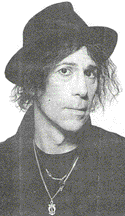 |
|
by Jim Farber

Even the loosest and most beguiling Romeos settle down sometime. Witness Warren Beatty. Or, for that matter, Peter Wolf. The former mouthpiece for The J. Geils Band rose to power as a jive talking Lothario, a rock n' roll hound dog of love, fast with a line and faster with an escape plan. Its not the kind of persona that ages well. So it's no wonder Wolf fell off pop's road map by the late '80s, shortly after he entered hi 40s. Band squabbles and waning musical inspiration didn't help matters any.
Now, at 52 and on a new label, Wolf has come back with a fresh album that uses his age and past experience to terrific advantage. After several ignored solo albums in the late '80s and early '90s, the vigor, beauty and honesty of this LP comes as a complete and delightful surprise. It's the comeback album of the year.
|
"Fool's Parade" picks a beat, melodic style and lyrical sensibility perfectly tuned to what could easily be Wolf's lfe right now. Lyrically, it's about the consequences of following a wandering eye for so long : You find yourself wracked with fear it may be too late to change. "That gypsy wind / once you let it in / it's a long way back again", Wolf sings at the albums start, setting a tone of warning and regret.
You can feel the weight of consequence in the music, which reworks the sexuality and pain of classic '60s soul balladry into a statement as personal as the best efforts by '70s singer-songwriters. The result falls somewhere between Don Covay and Carole King. The songs, all midpaced and beautiful, combine warm Memphis organs, Springsteenesque harmonicas, a light punch of Star horns and a fine spine of electric guitar.
A song like "Pleasing To Me" tempers the guitar hook from Smokey Robinson's "Cruisin'" with the contemplative romance of a Stylistics hit, while "Turnin' Pages" takes the kind of shiny reggae beat J. Geils might have used in their flip '80s hits, but adds gravity. Producers Wolf and Kenny White keep the arrangements spare and the sound crisp, leaving plenty of room around the star's voice. Wolf's singing stands at dead center in every mix, allowing him to reveal more feeling than he has in his 30 year career.
Wolf has likewise retooled his lyrical style. To the precise degree that his early works were funny, now he's moving. "Time is like a knife / it cuts up your life and it's gone" he writes in "The Cold Heart Of The Stone", while in "All Torn Up" he makes smart use of a pop-culture touchstone : "My love just keeps on turning on and off / like a flashing neon sign". He's at his most complex in "Ride Lonesome, Ride Hard", where the title works as both a cautionary slogan and a piece of advice for those far gone in playboy life.
Wolf even managed to close his album with an ideal last line. "When will it all be over?" he asks as the music ends. It's a perfect way to make the album's theme cohere, offering an ideal capper for this, the ballad of a cad coming clean.
|
|
|